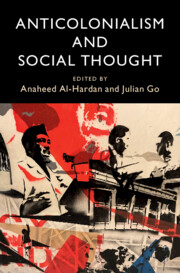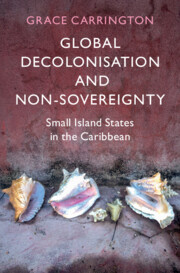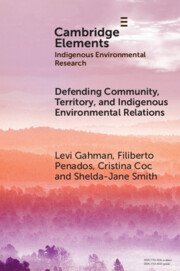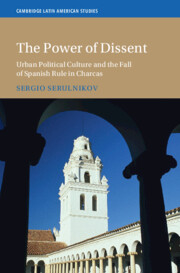Refine search
Actions for selected content:
1043 results
Notebook
-
- Book:
- The Epistemology of the Secret
- Published online:
- 23 July 2025
- Print publication:
- 09 October 2025, pp 145-154
-
- Chapter
- Export citation
20 - Christology and Political Theology
- from Part IIIb - Christology and Philosophical Theology
-
-
- Book:
- The Cambridge Companion to Christology
- Published online:
- 15 September 2025
- Print publication:
- 02 October 2025, pp 340-358
-
- Chapter
- Export citation
8 - Anticolonial Sociology in Latin America, 1950–1970
- from Part II - Schools of Thought
-
-
- Book:
- Anticolonialism and Social Thought
- Published online:
- 16 September 2025
- Print publication:
- 25 September 2025, pp 186-208
-
- Chapter
- Export citation
4 - Decolonization as Transformation
- from Part I - Activists, Intellectuals, and Movements
-
-
- Book:
- Anticolonialism and Social Thought
- Published online:
- 16 September 2025
- Print publication:
- 25 September 2025, pp 91-114
-
- Chapter
- Export citation
Rebels and Rivals in a Syrian Town: Musa al-Naddaf, Syrian Nationalist Rebel, Colonial Fugitive, West Virginia Grocer, 1899–1963
-
- Journal:
- International Journal of Middle East Studies , First View
- Published online by Cambridge University Press:
- 25 September 2025, pp. 1-24
-
- Article
-
- You have access
- Open access
- HTML
- Export citation

Anticolonialism and Social Thought
-
- Published online:
- 16 September 2025
- Print publication:
- 25 September 2025

Global Decolonisation and Non-Sovereignty
- Small Island States in the Caribbean
-
- Published online:
- 16 September 2025
- Print publication:
- 31 July 2025
Introduction
-
- Book:
- Black Catholic Worlds
- Published online:
- 28 August 2025
- Print publication:
- 11 September 2025, pp 1-34
-
- Chapter
- Export citation
How the Past Became a Weapon of Genocide in Palestine
- Part of
-
- Journal:
- Public Humanities / Volume 1 / 2025
- Published online by Cambridge University Press:
- 04 September 2025, e134
-
- Article
-
- You have access
- Open access
- HTML
- Export citation
Making Violators: Employers and African Workers in Colonial Dakar, 1918–43
-
- Journal:
- The Journal of African History / Volume 66 / 2025
- Published online by Cambridge University Press:
- 27 August 2025, e9
-
- Article
-
- You have access
- Open access
- HTML
- Export citation
9 - Joyce, Colonialism, and Nationalism
-
-
- Book:
- The Cambridge Companion to James Joyce
- Published online:
- 14 August 2025
- Print publication:
- 21 August 2025, pp 153-168
-
- Chapter
- Export citation

Defending Community, Territory, and Indigenous Environmental Relations
-
- Published online:
- 08 August 2025
- Print publication:
- 11 September 2025
-
- Element
-
- You have access
- Open access
- HTML
- Export citation

The Power of Dissent
- Urban Political Culture and the Fall of Spanish Rule in Charcas
-
- Published online:
- 07 August 2025
- Print publication:
- 07 August 2025
3 - The Case of Cameroon
-
- Book:
- The Autocratic Voter
- Published online:
- 13 August 2025
- Print publication:
- 07 August 2025, pp 57-78
-
- Chapter
- Export citation
6 - Meritocracy and Patronage in Colonial Southeast Asia
-
- Book:
- States against Nations
- Published online:
- 14 August 2025
- Print publication:
- 07 August 2025, pp 155-184
-
- Chapter
- Export citation
Cascade Effects of Community Archaeology
-
- Journal:
- Advances in Archaeological Practice / Volume 13 / Issue 2 / May 2025
- Published online by Cambridge University Press:
- 04 August 2025, pp. 151-166
-
- Article
-
- You have access
- Open access
- HTML
- Export citation
M’addibs and Migrant Laborers: Migration from Ottoman Trablus al-Gharb to Djerba, Tunisia in the Early 20th Century
-
- Journal:
- International Journal of Middle East Studies , First View
- Published online by Cambridge University Press:
- 04 August 2025, pp. 1-19
-
- Article
-
- You have access
- Open access
- HTML
- Export citation
2 - Demarcations
- from Part II - Making the Borderlands
-
- Book:
- Fractured Pasts in Lake Kivu’s Borderlands
- Published online:
- 17 July 2025
- Print publication:
- 31 July 2025, pp 87-113
-
- Chapter
- Export citation
3 - Religious Networks in the Age of Empire in New Spain and Africa
-
- Book:
- Christianity at the Crossroads
- Published online:
- 19 May 2025
- Print publication:
- 31 July 2025, pp 76-107
-
- Chapter
- Export citation
Chapter 8 - Poetics of Alterity
-
- Book:
- Healing and the Invention of Metaphor
- Published online:
- 17 July 2025
- Print publication:
- 31 July 2025, pp 201-229
-
- Chapter
- Export citation
